Emotional Intelligence Development Plan and Workplace Analysis
VerifiedAdded on 2023/01/13
|16
|4008
|60
Report
AI Summary
This report delves into the multifaceted concept of emotional intelligence (EI) and its crucial role in the workplace. Task 1 defines emotional intelligence, highlighting its significance and outlining the five essential principles defined by Daniel Goleman. It explores the principles of emotional intelligence theory developed by Caruso and Salovey, along with strategies for building EI, and how high EI managers can achieve business objectives. The report also emphasizes the importance of recognizing cultural differences in emotional expression, providing examples and communication strategies. Task 2 involves a personality test analysis, reflecting on results, identifying emotional strengths and weaknesses, and how these impact workplace performance. It includes a table of personal stressors and a list of needs, culminating in an emotional intelligence development plan. Task 3 presents a case study involving workplace scenarios, analyzing potential emotions of individuals, exploring cultural differences in emotional expression, and outlining techniques for effective communication and conflict resolution. The report includes step-by-step approaches for resolving workplace situations, sample questions for meetings, and email communications, providing a comprehensive overview of emotional intelligence in a professional context.
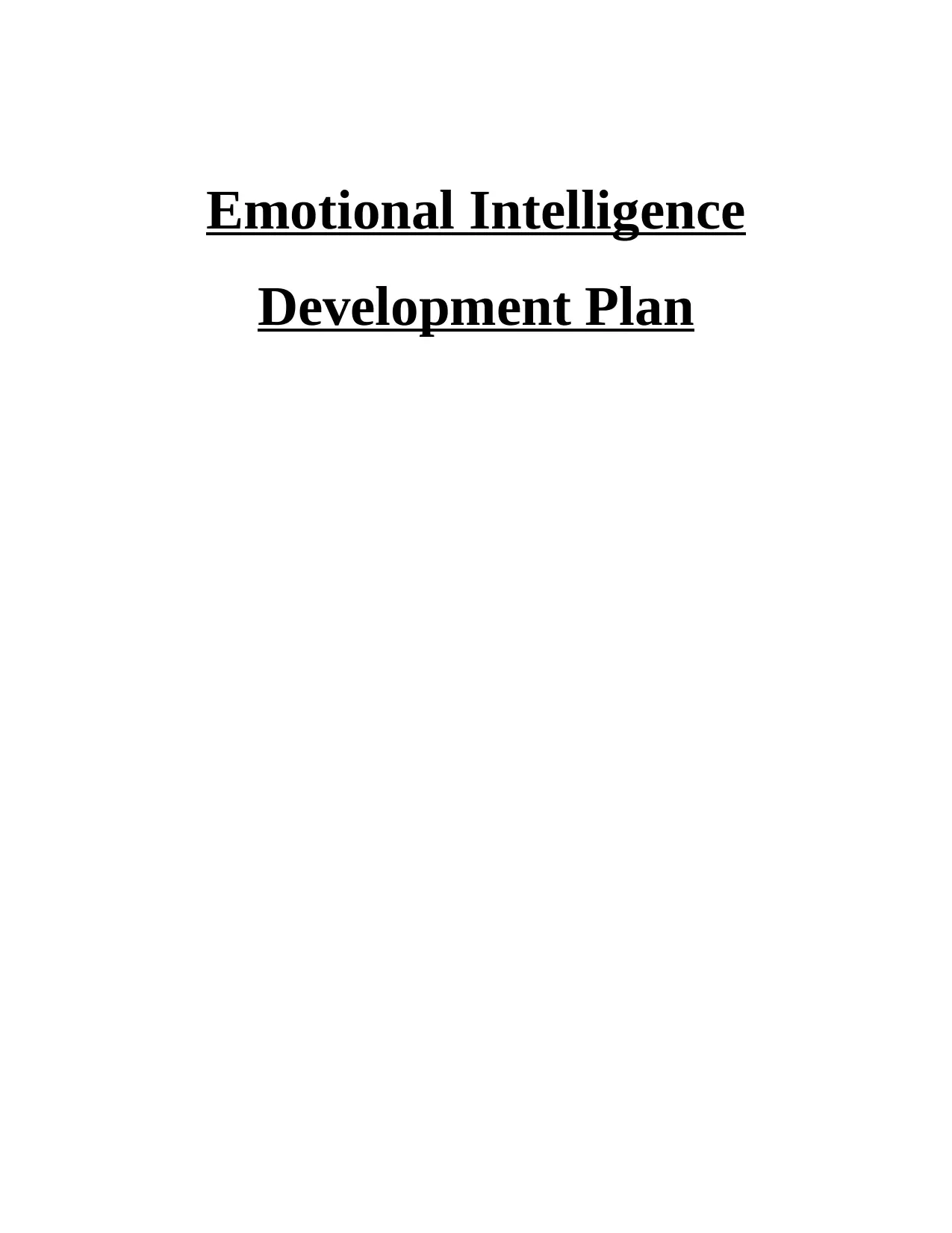
Emotional Intelligence
Development Plan
Development Plan
Paraphrase This Document
Need a fresh take? Get an instant paraphrase of this document with our AI Paraphraser
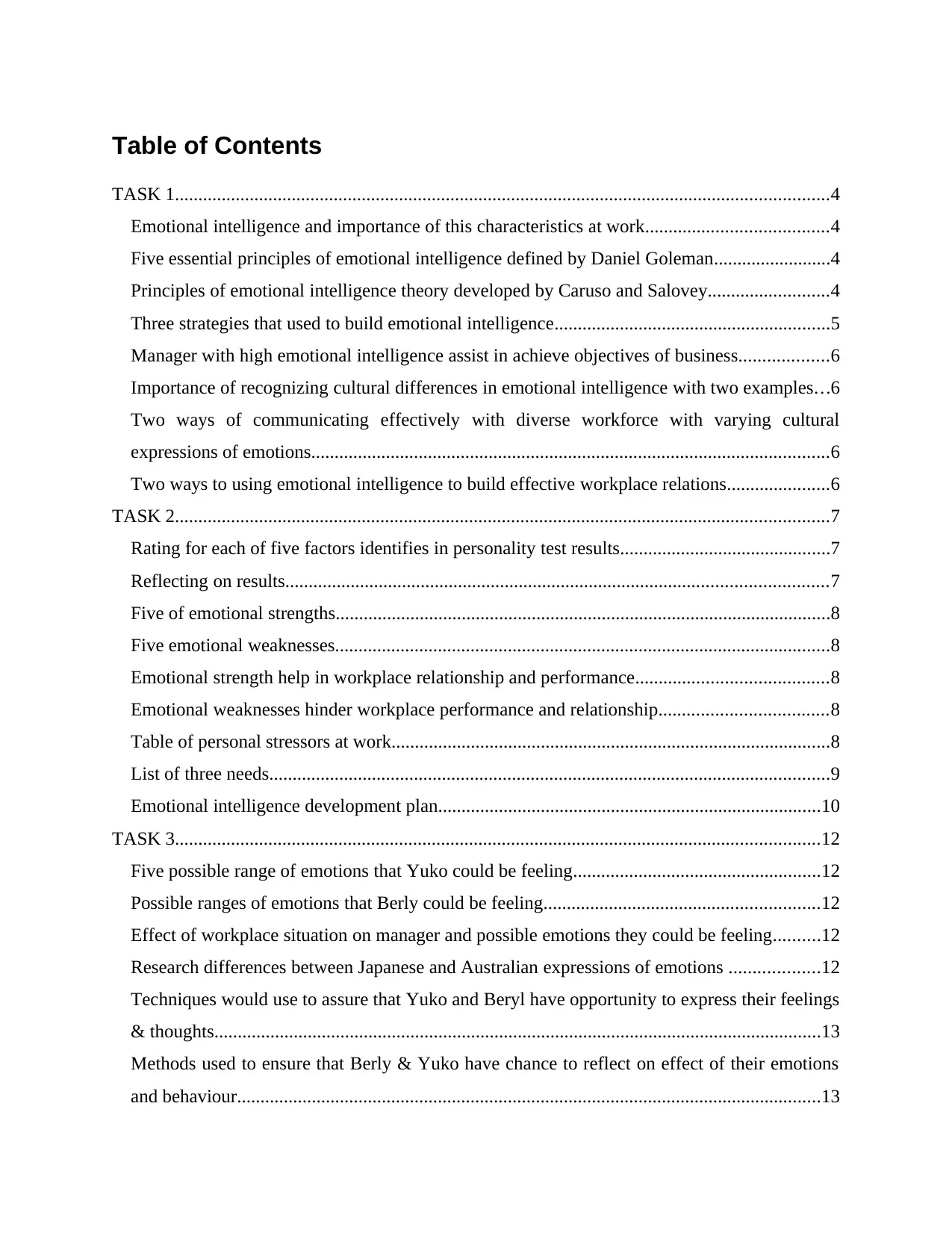
Table of Contents
TASK 1............................................................................................................................................4
Emotional intelligence and importance of this characteristics at work.......................................4
Five essential principles of emotional intelligence defined by Daniel Goleman.........................4
Principles of emotional intelligence theory developed by Caruso and Salovey..........................4
Three strategies that used to build emotional intelligence...........................................................5
Manager with high emotional intelligence assist in achieve objectives of business...................6
Importance of recognizing cultural differences in emotional intelligence with two examples...6
Two ways of communicating effectively with diverse workforce with varying cultural
expressions of emotions...............................................................................................................6
Two ways to using emotional intelligence to build effective workplace relations......................6
TASK 2............................................................................................................................................7
Rating for each of five factors identifies in personality test results.............................................7
Reflecting on results....................................................................................................................7
Five of emotional strengths..........................................................................................................8
Five emotional weaknesses..........................................................................................................8
Emotional strength help in workplace relationship and performance.........................................8
Emotional weaknesses hinder workplace performance and relationship....................................8
Table of personal stressors at work..............................................................................................8
List of three needs........................................................................................................................9
Emotional intelligence development plan..................................................................................10
TASK 3..........................................................................................................................................12
Five possible range of emotions that Yuko could be feeling.....................................................12
Possible ranges of emotions that Berly could be feeling...........................................................12
Effect of workplace situation on manager and possible emotions they could be feeling..........12
Research differences between Japanese and Australian expressions of emotions ...................12
Techniques would use to assure that Yuko and Beryl have opportunity to express their feelings
& thoughts..................................................................................................................................13
Methods used to ensure that Berly & Yuko have chance to reflect on effect of their emotions
and behaviour.............................................................................................................................13
TASK 1............................................................................................................................................4
Emotional intelligence and importance of this characteristics at work.......................................4
Five essential principles of emotional intelligence defined by Daniel Goleman.........................4
Principles of emotional intelligence theory developed by Caruso and Salovey..........................4
Three strategies that used to build emotional intelligence...........................................................5
Manager with high emotional intelligence assist in achieve objectives of business...................6
Importance of recognizing cultural differences in emotional intelligence with two examples...6
Two ways of communicating effectively with diverse workforce with varying cultural
expressions of emotions...............................................................................................................6
Two ways to using emotional intelligence to build effective workplace relations......................6
TASK 2............................................................................................................................................7
Rating for each of five factors identifies in personality test results.............................................7
Reflecting on results....................................................................................................................7
Five of emotional strengths..........................................................................................................8
Five emotional weaknesses..........................................................................................................8
Emotional strength help in workplace relationship and performance.........................................8
Emotional weaknesses hinder workplace performance and relationship....................................8
Table of personal stressors at work..............................................................................................8
List of three needs........................................................................................................................9
Emotional intelligence development plan..................................................................................10
TASK 3..........................................................................................................................................12
Five possible range of emotions that Yuko could be feeling.....................................................12
Possible ranges of emotions that Berly could be feeling...........................................................12
Effect of workplace situation on manager and possible emotions they could be feeling..........12
Research differences between Japanese and Australian expressions of emotions ...................12
Techniques would use to assure that Yuko and Beryl have opportunity to express their feelings
& thoughts..................................................................................................................................13
Methods used to ensure that Berly & Yuko have chance to reflect on effect of their emotions
and behaviour.............................................................................................................................13
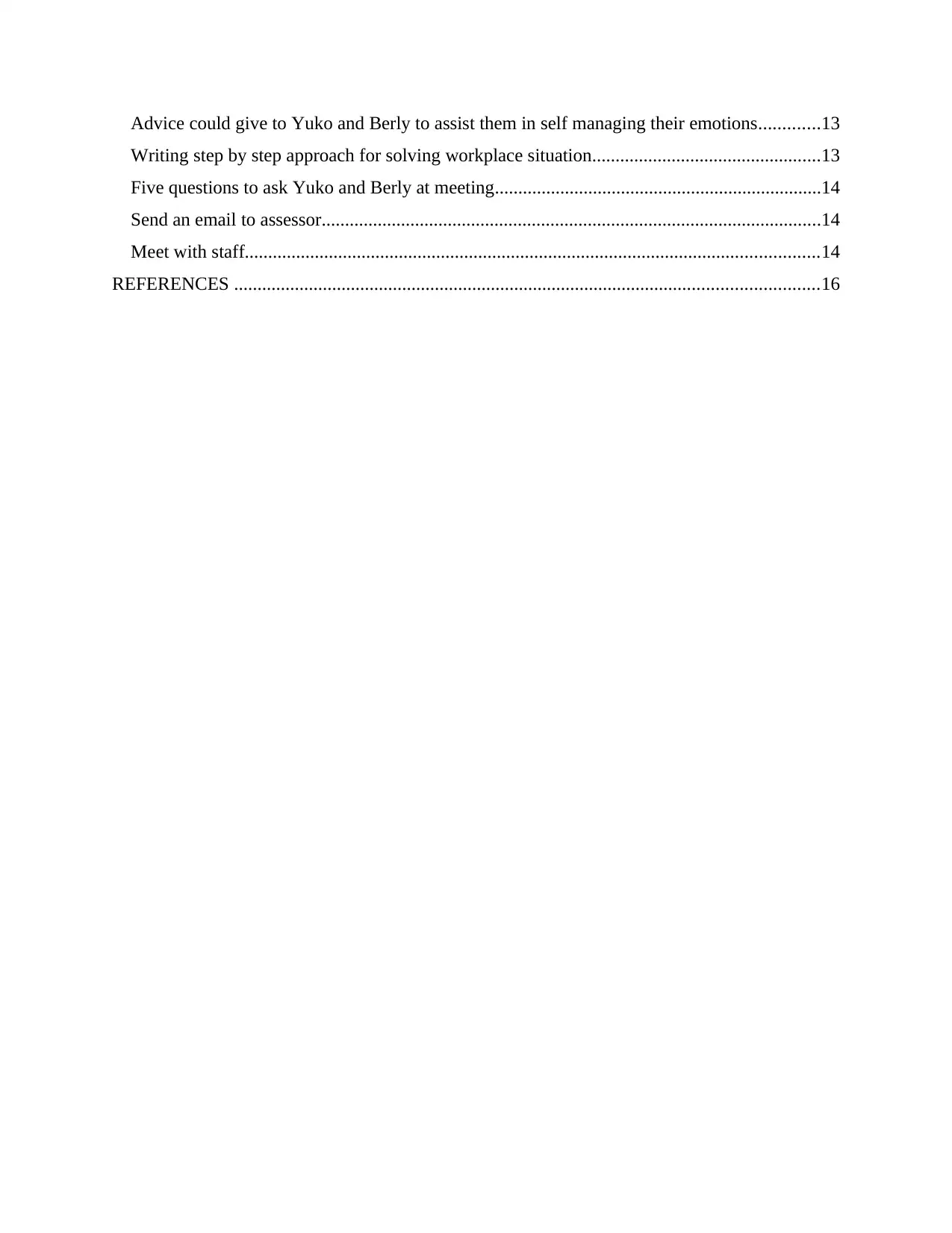
Advice could give to Yuko and Berly to assist them in self managing their emotions.............13
Writing step by step approach for solving workplace situation.................................................13
Five questions to ask Yuko and Berly at meeting......................................................................14
Send an email to assessor...........................................................................................................14
Meet with staff...........................................................................................................................14
REFERENCES .............................................................................................................................16
Writing step by step approach for solving workplace situation.................................................13
Five questions to ask Yuko and Berly at meeting......................................................................14
Send an email to assessor...........................................................................................................14
Meet with staff...........................................................................................................................14
REFERENCES .............................................................................................................................16
⊘ This is a preview!⊘
Do you want full access?
Subscribe today to unlock all pages.

Trusted by 1+ million students worldwide
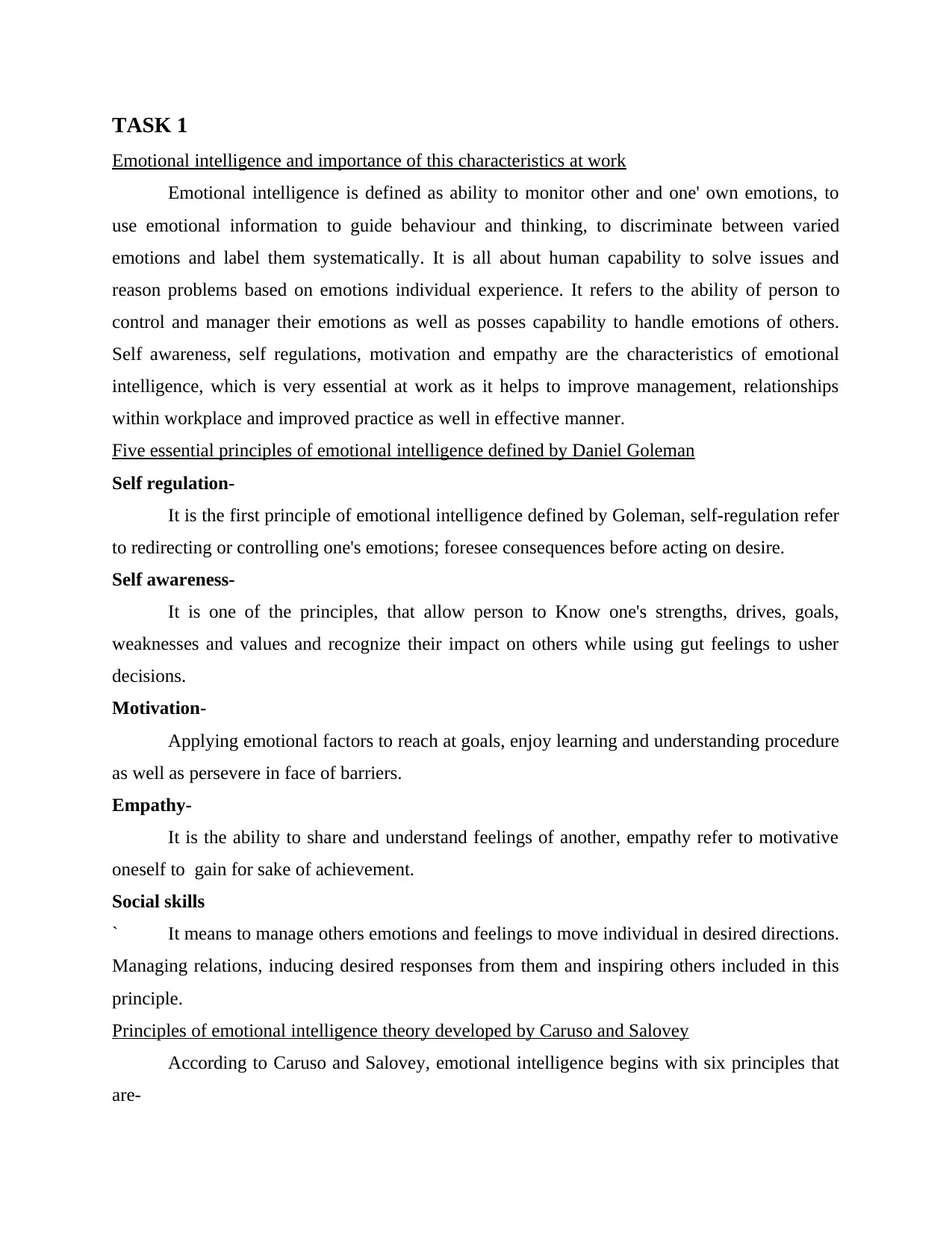
TASK 1
Emotional intelligence and importance of this characteristics at work
Emotional intelligence is defined as ability to monitor other and one' own emotions, to
use emotional information to guide behaviour and thinking, to discriminate between varied
emotions and label them systematically. It is all about human capability to solve issues and
reason problems based on emotions individual experience. It refers to the ability of person to
control and manager their emotions as well as posses capability to handle emotions of others.
Self awareness, self regulations, motivation and empathy are the characteristics of emotional
intelligence, which is very essential at work as it helps to improve management, relationships
within workplace and improved practice as well in effective manner.
Five essential principles of emotional intelligence defined by Daniel Goleman
Self regulation-
It is the first principle of emotional intelligence defined by Goleman, self-regulation refer
to redirecting or controlling one's emotions; foresee consequences before acting on desire.
Self awareness-
It is one of the principles, that allow person to Know one's strengths, drives, goals,
weaknesses and values and recognize their impact on others while using gut feelings to usher
decisions.
Motivation-
Applying emotional factors to reach at goals, enjoy learning and understanding procedure
as well as persevere in face of barriers.
Empathy-
It is the ability to share and understand feelings of another, empathy refer to motivative
oneself to gain for sake of achievement.
Social skills
` It means to manage others emotions and feelings to move individual in desired directions.
Managing relations, inducing desired responses from them and inspiring others included in this
principle.
Principles of emotional intelligence theory developed by Caruso and Salovey
According to Caruso and Salovey, emotional intelligence begins with six principles that
are-
Emotional intelligence and importance of this characteristics at work
Emotional intelligence is defined as ability to monitor other and one' own emotions, to
use emotional information to guide behaviour and thinking, to discriminate between varied
emotions and label them systematically. It is all about human capability to solve issues and
reason problems based on emotions individual experience. It refers to the ability of person to
control and manager their emotions as well as posses capability to handle emotions of others.
Self awareness, self regulations, motivation and empathy are the characteristics of emotional
intelligence, which is very essential at work as it helps to improve management, relationships
within workplace and improved practice as well in effective manner.
Five essential principles of emotional intelligence defined by Daniel Goleman
Self regulation-
It is the first principle of emotional intelligence defined by Goleman, self-regulation refer
to redirecting or controlling one's emotions; foresee consequences before acting on desire.
Self awareness-
It is one of the principles, that allow person to Know one's strengths, drives, goals,
weaknesses and values and recognize their impact on others while using gut feelings to usher
decisions.
Motivation-
Applying emotional factors to reach at goals, enjoy learning and understanding procedure
as well as persevere in face of barriers.
Empathy-
It is the ability to share and understand feelings of another, empathy refer to motivative
oneself to gain for sake of achievement.
Social skills
` It means to manage others emotions and feelings to move individual in desired directions.
Managing relations, inducing desired responses from them and inspiring others included in this
principle.
Principles of emotional intelligence theory developed by Caruso and Salovey
According to Caruso and Salovey, emotional intelligence begins with six principles that
are-
Paraphrase This Document
Need a fresh take? Get an instant paraphrase of this document with our AI Paraphraser
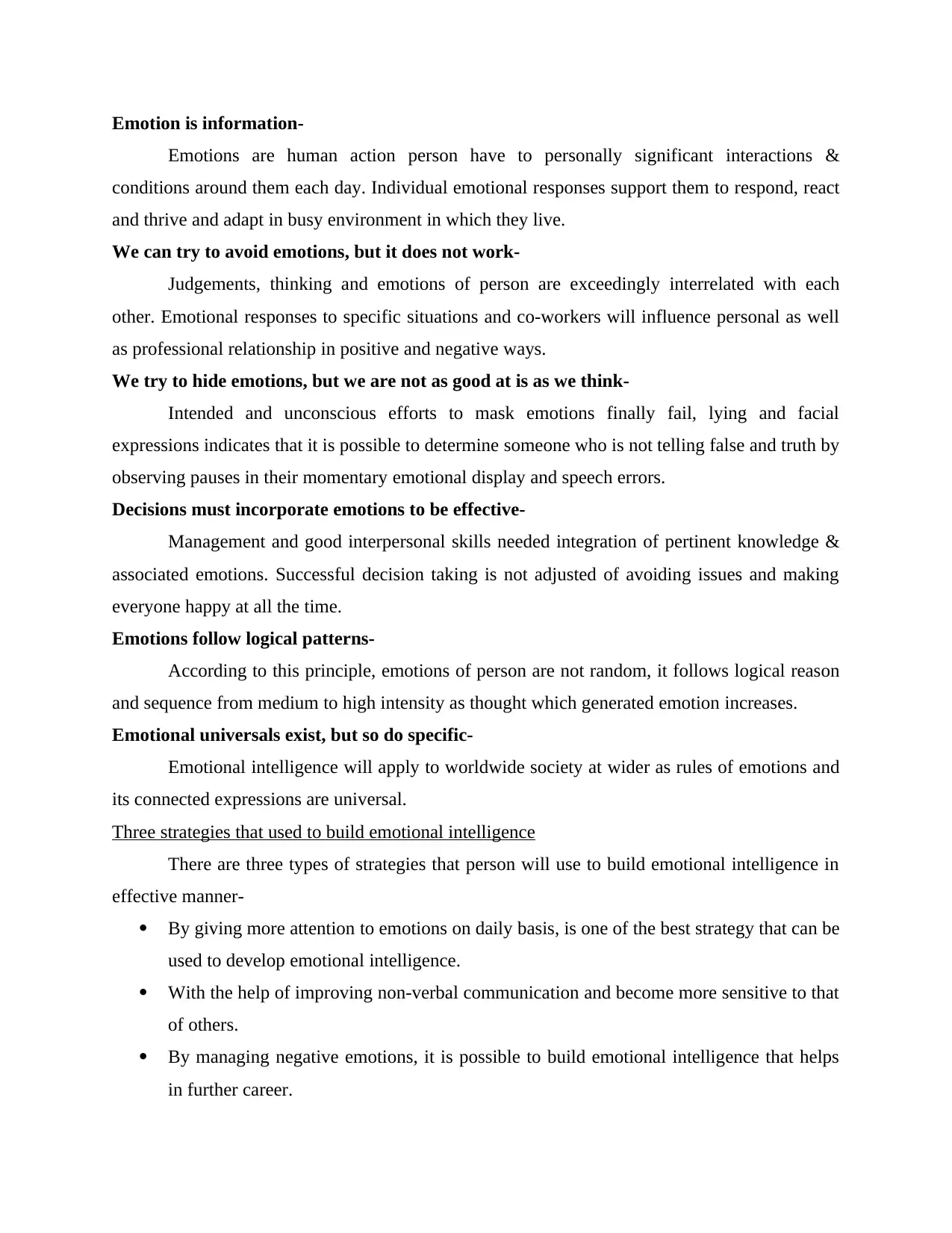
Emotion is information-
Emotions are human action person have to personally significant interactions &
conditions around them each day. Individual emotional responses support them to respond, react
and thrive and adapt in busy environment in which they live.
We can try to avoid emotions, but it does not work-
Judgements, thinking and emotions of person are exceedingly interrelated with each
other. Emotional responses to specific situations and co-workers will influence personal as well
as professional relationship in positive and negative ways.
We try to hide emotions, but we are not as good at is as we think-
Intended and unconscious efforts to mask emotions finally fail, lying and facial
expressions indicates that it is possible to determine someone who is not telling false and truth by
observing pauses in their momentary emotional display and speech errors.
Decisions must incorporate emotions to be effective-
Management and good interpersonal skills needed integration of pertinent knowledge &
associated emotions. Successful decision taking is not adjusted of avoiding issues and making
everyone happy at all the time.
Emotions follow logical patterns-
According to this principle, emotions of person are not random, it follows logical reason
and sequence from medium to high intensity as thought which generated emotion increases.
Emotional universals exist, but so do specific-
Emotional intelligence will apply to worldwide society at wider as rules of emotions and
its connected expressions are universal.
Three strategies that used to build emotional intelligence
There are three types of strategies that person will use to build emotional intelligence in
effective manner-
By giving more attention to emotions on daily basis, is one of the best strategy that can be
used to develop emotional intelligence.
With the help of improving non-verbal communication and become more sensitive to that
of others.
By managing negative emotions, it is possible to build emotional intelligence that helps
in further career.
Emotions are human action person have to personally significant interactions &
conditions around them each day. Individual emotional responses support them to respond, react
and thrive and adapt in busy environment in which they live.
We can try to avoid emotions, but it does not work-
Judgements, thinking and emotions of person are exceedingly interrelated with each
other. Emotional responses to specific situations and co-workers will influence personal as well
as professional relationship in positive and negative ways.
We try to hide emotions, but we are not as good at is as we think-
Intended and unconscious efforts to mask emotions finally fail, lying and facial
expressions indicates that it is possible to determine someone who is not telling false and truth by
observing pauses in their momentary emotional display and speech errors.
Decisions must incorporate emotions to be effective-
Management and good interpersonal skills needed integration of pertinent knowledge &
associated emotions. Successful decision taking is not adjusted of avoiding issues and making
everyone happy at all the time.
Emotions follow logical patterns-
According to this principle, emotions of person are not random, it follows logical reason
and sequence from medium to high intensity as thought which generated emotion increases.
Emotional universals exist, but so do specific-
Emotional intelligence will apply to worldwide society at wider as rules of emotions and
its connected expressions are universal.
Three strategies that used to build emotional intelligence
There are three types of strategies that person will use to build emotional intelligence in
effective manner-
By giving more attention to emotions on daily basis, is one of the best strategy that can be
used to develop emotional intelligence.
With the help of improving non-verbal communication and become more sensitive to that
of others.
By managing negative emotions, it is possible to build emotional intelligence that helps
in further career.
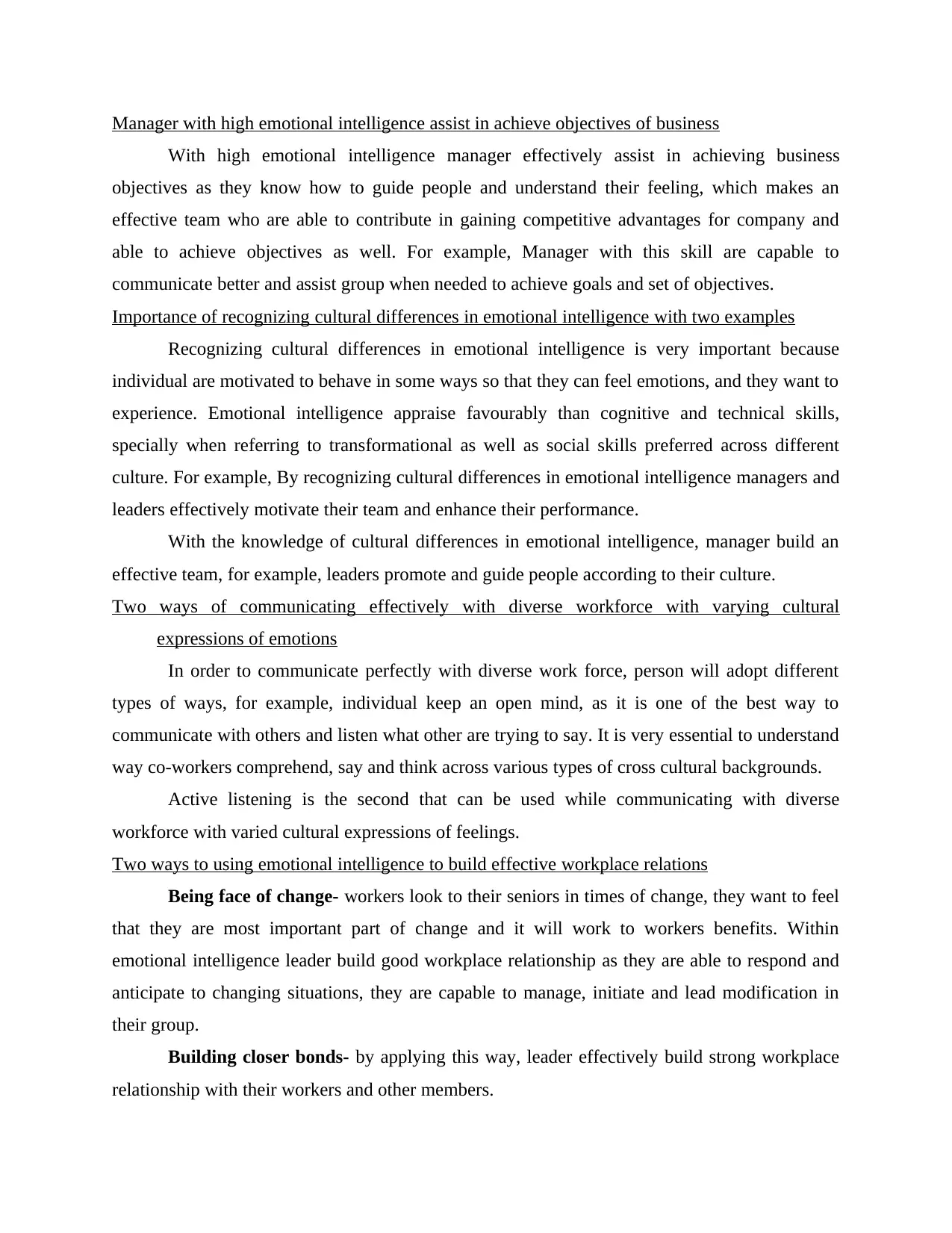
Manager with high emotional intelligence assist in achieve objectives of business
With high emotional intelligence manager effectively assist in achieving business
objectives as they know how to guide people and understand their feeling, which makes an
effective team who are able to contribute in gaining competitive advantages for company and
able to achieve objectives as well. For example, Manager with this skill are capable to
communicate better and assist group when needed to achieve goals and set of objectives.
Importance of recognizing cultural differences in emotional intelligence with two examples
Recognizing cultural differences in emotional intelligence is very important because
individual are motivated to behave in some ways so that they can feel emotions, and they want to
experience. Emotional intelligence appraise favourably than cognitive and technical skills,
specially when referring to transformational as well as social skills preferred across different
culture. For example, By recognizing cultural differences in emotional intelligence managers and
leaders effectively motivate their team and enhance their performance.
With the knowledge of cultural differences in emotional intelligence, manager build an
effective team, for example, leaders promote and guide people according to their culture.
Two ways of communicating effectively with diverse workforce with varying cultural
expressions of emotions
In order to communicate perfectly with diverse work force, person will adopt different
types of ways, for example, individual keep an open mind, as it is one of the best way to
communicate with others and listen what other are trying to say. It is very essential to understand
way co-workers comprehend, say and think across various types of cross cultural backgrounds.
Active listening is the second that can be used while communicating with diverse
workforce with varied cultural expressions of feelings.
Two ways to using emotional intelligence to build effective workplace relations
Being face of change- workers look to their seniors in times of change, they want to feel
that they are most important part of change and it will work to workers benefits. Within
emotional intelligence leader build good workplace relationship as they are able to respond and
anticipate to changing situations, they are capable to manage, initiate and lead modification in
their group.
Building closer bonds- by applying this way, leader effectively build strong workplace
relationship with their workers and other members.
With high emotional intelligence manager effectively assist in achieving business
objectives as they know how to guide people and understand their feeling, which makes an
effective team who are able to contribute in gaining competitive advantages for company and
able to achieve objectives as well. For example, Manager with this skill are capable to
communicate better and assist group when needed to achieve goals and set of objectives.
Importance of recognizing cultural differences in emotional intelligence with two examples
Recognizing cultural differences in emotional intelligence is very important because
individual are motivated to behave in some ways so that they can feel emotions, and they want to
experience. Emotional intelligence appraise favourably than cognitive and technical skills,
specially when referring to transformational as well as social skills preferred across different
culture. For example, By recognizing cultural differences in emotional intelligence managers and
leaders effectively motivate their team and enhance their performance.
With the knowledge of cultural differences in emotional intelligence, manager build an
effective team, for example, leaders promote and guide people according to their culture.
Two ways of communicating effectively with diverse workforce with varying cultural
expressions of emotions
In order to communicate perfectly with diverse work force, person will adopt different
types of ways, for example, individual keep an open mind, as it is one of the best way to
communicate with others and listen what other are trying to say. It is very essential to understand
way co-workers comprehend, say and think across various types of cross cultural backgrounds.
Active listening is the second that can be used while communicating with diverse
workforce with varied cultural expressions of feelings.
Two ways to using emotional intelligence to build effective workplace relations
Being face of change- workers look to their seniors in times of change, they want to feel
that they are most important part of change and it will work to workers benefits. Within
emotional intelligence leader build good workplace relationship as they are able to respond and
anticipate to changing situations, they are capable to manage, initiate and lead modification in
their group.
Building closer bonds- by applying this way, leader effectively build strong workplace
relationship with their workers and other members.
⊘ This is a preview!⊘
Do you want full access?
Subscribe today to unlock all pages.

Trusted by 1+ million students worldwide
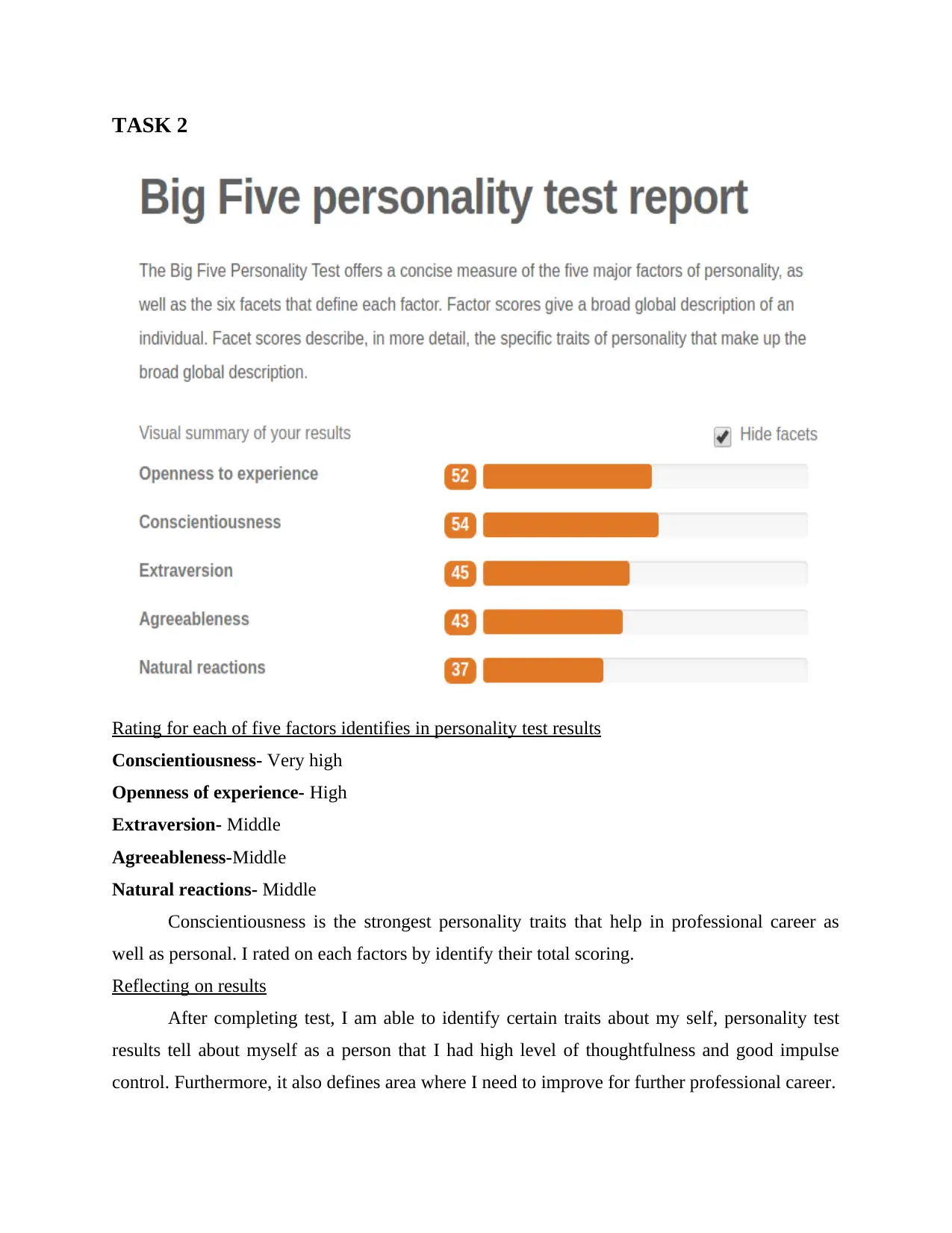
TASK 2
Rating for each of five factors identifies in personality test results
Conscientiousness- Very high
Openness of experience- High
Extraversion- Middle
Agreeableness-Middle
Natural reactions- Middle
Conscientiousness is the strongest personality traits that help in professional career as
well as personal. I rated on each factors by identify their total scoring.
Reflecting on results
After completing test, I am able to identify certain traits about my self, personality test
results tell about myself as a person that I had high level of thoughtfulness and good impulse
control. Furthermore, it also defines area where I need to improve for further professional career.
Rating for each of five factors identifies in personality test results
Conscientiousness- Very high
Openness of experience- High
Extraversion- Middle
Agreeableness-Middle
Natural reactions- Middle
Conscientiousness is the strongest personality traits that help in professional career as
well as personal. I rated on each factors by identify their total scoring.
Reflecting on results
After completing test, I am able to identify certain traits about my self, personality test
results tell about myself as a person that I had high level of thoughtfulness and good impulse
control. Furthermore, it also defines area where I need to improve for further professional career.
Paraphrase This Document
Need a fresh take? Get an instant paraphrase of this document with our AI Paraphraser
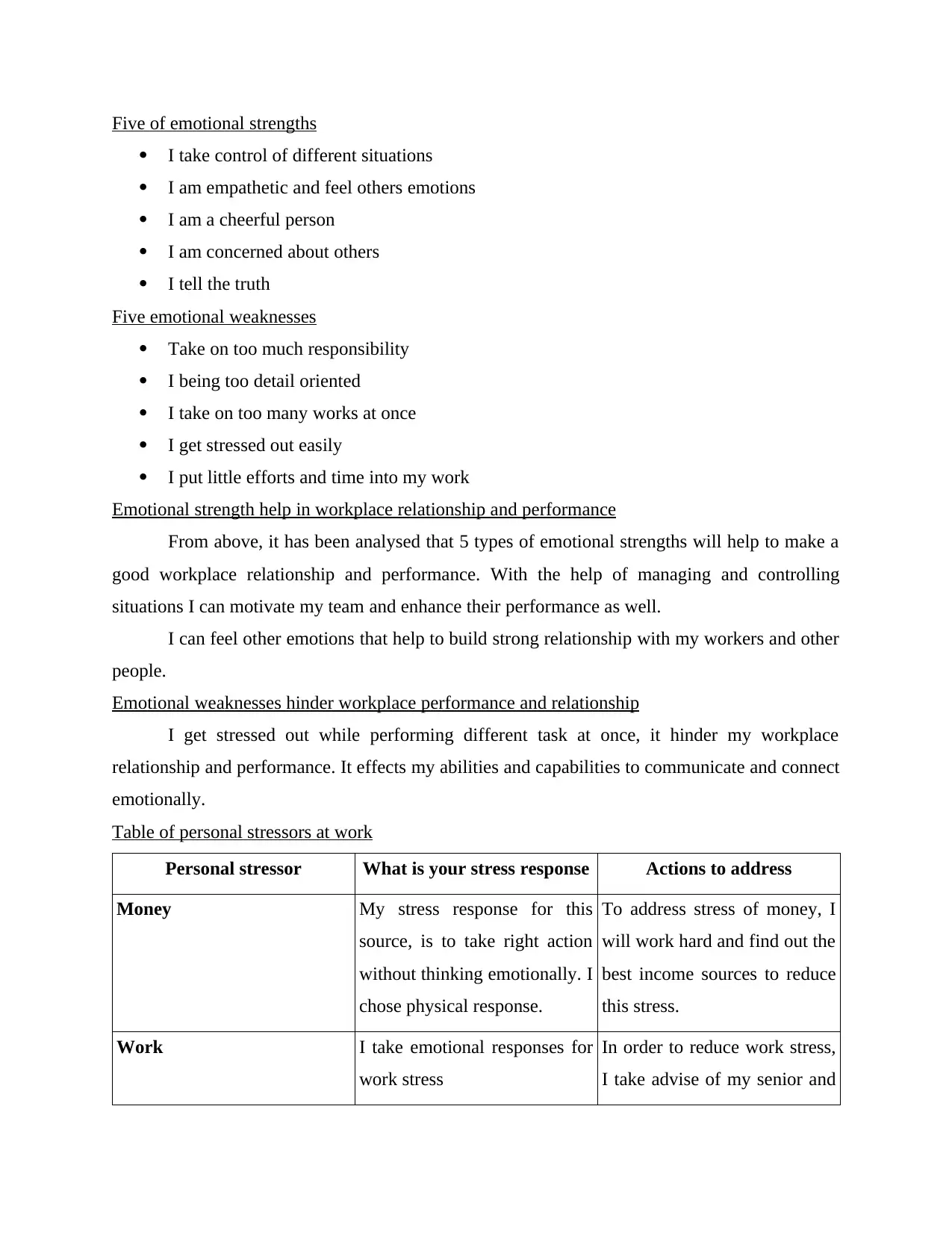
Five of emotional strengths
I take control of different situations
I am empathetic and feel others emotions
I am a cheerful person
I am concerned about others
I tell the truth
Five emotional weaknesses
Take on too much responsibility
I being too detail oriented
I take on too many works at once
I get stressed out easily
I put little efforts and time into my work
Emotional strength help in workplace relationship and performance
From above, it has been analysed that 5 types of emotional strengths will help to make a
good workplace relationship and performance. With the help of managing and controlling
situations I can motivate my team and enhance their performance as well.
I can feel other emotions that help to build strong relationship with my workers and other
people.
Emotional weaknesses hinder workplace performance and relationship
I get stressed out while performing different task at once, it hinder my workplace
relationship and performance. It effects my abilities and capabilities to communicate and connect
emotionally.
Table of personal stressors at work
Personal stressor What is your stress response Actions to address
Money My stress response for this
source, is to take right action
without thinking emotionally. I
chose physical response.
To address stress of money, I
will work hard and find out the
best income sources to reduce
this stress.
Work I take emotional responses for
work stress
In order to reduce work stress,
I take advise of my senior and
I take control of different situations
I am empathetic and feel others emotions
I am a cheerful person
I am concerned about others
I tell the truth
Five emotional weaknesses
Take on too much responsibility
I being too detail oriented
I take on too many works at once
I get stressed out easily
I put little efforts and time into my work
Emotional strength help in workplace relationship and performance
From above, it has been analysed that 5 types of emotional strengths will help to make a
good workplace relationship and performance. With the help of managing and controlling
situations I can motivate my team and enhance their performance as well.
I can feel other emotions that help to build strong relationship with my workers and other
people.
Emotional weaknesses hinder workplace performance and relationship
I get stressed out while performing different task at once, it hinder my workplace
relationship and performance. It effects my abilities and capabilities to communicate and connect
emotionally.
Table of personal stressors at work
Personal stressor What is your stress response Actions to address
Money My stress response for this
source, is to take right action
without thinking emotionally. I
chose physical response.
To address stress of money, I
will work hard and find out the
best income sources to reduce
this stress.
Work I take emotional responses for
work stress
In order to reduce work stress,
I take advise of my senior and
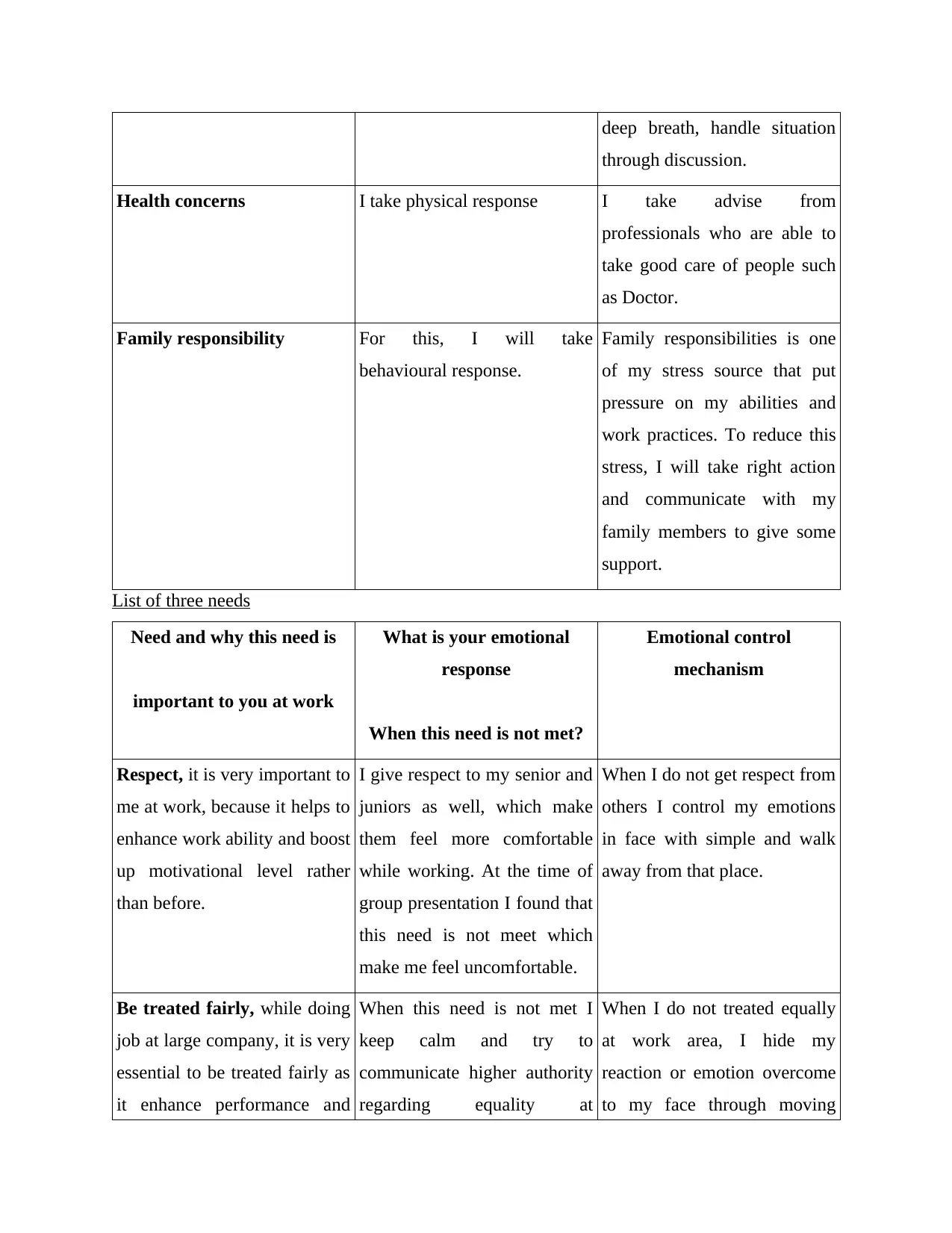
deep breath, handle situation
through discussion.
Health concerns I take physical response I take advise from
professionals who are able to
take good care of people such
as Doctor.
Family responsibility For this, I will take
behavioural response.
Family responsibilities is one
of my stress source that put
pressure on my abilities and
work practices. To reduce this
stress, I will take right action
and communicate with my
family members to give some
support.
List of three needs
Need and why this need is
important to you at work
What is your emotional
response
When this need is not met?
Emotional control
mechanism
Respect, it is very important to
me at work, because it helps to
enhance work ability and boost
up motivational level rather
than before.
I give respect to my senior and
juniors as well, which make
them feel more comfortable
while working. At the time of
group presentation I found that
this need is not meet which
make me feel uncomfortable.
When I do not get respect from
others I control my emotions
in face with simple and walk
away from that place.
Be treated fairly, while doing
job at large company, it is very
essential to be treated fairly as
it enhance performance and
When this need is not met I
keep calm and try to
communicate higher authority
regarding equality at
When I do not treated equally
at work area, I hide my
reaction or emotion overcome
to my face through moving
through discussion.
Health concerns I take physical response I take advise from
professionals who are able to
take good care of people such
as Doctor.
Family responsibility For this, I will take
behavioural response.
Family responsibilities is one
of my stress source that put
pressure on my abilities and
work practices. To reduce this
stress, I will take right action
and communicate with my
family members to give some
support.
List of three needs
Need and why this need is
important to you at work
What is your emotional
response
When this need is not met?
Emotional control
mechanism
Respect, it is very important to
me at work, because it helps to
enhance work ability and boost
up motivational level rather
than before.
I give respect to my senior and
juniors as well, which make
them feel more comfortable
while working. At the time of
group presentation I found that
this need is not meet which
make me feel uncomfortable.
When I do not get respect from
others I control my emotions
in face with simple and walk
away from that place.
Be treated fairly, while doing
job at large company, it is very
essential to be treated fairly as
it enhance performance and
When this need is not met I
keep calm and try to
communicate higher authority
regarding equality at
When I do not treated equally
at work area, I hide my
reaction or emotion overcome
to my face through moving
⊘ This is a preview!⊘
Do you want full access?
Subscribe today to unlock all pages.

Trusted by 1+ million students worldwide
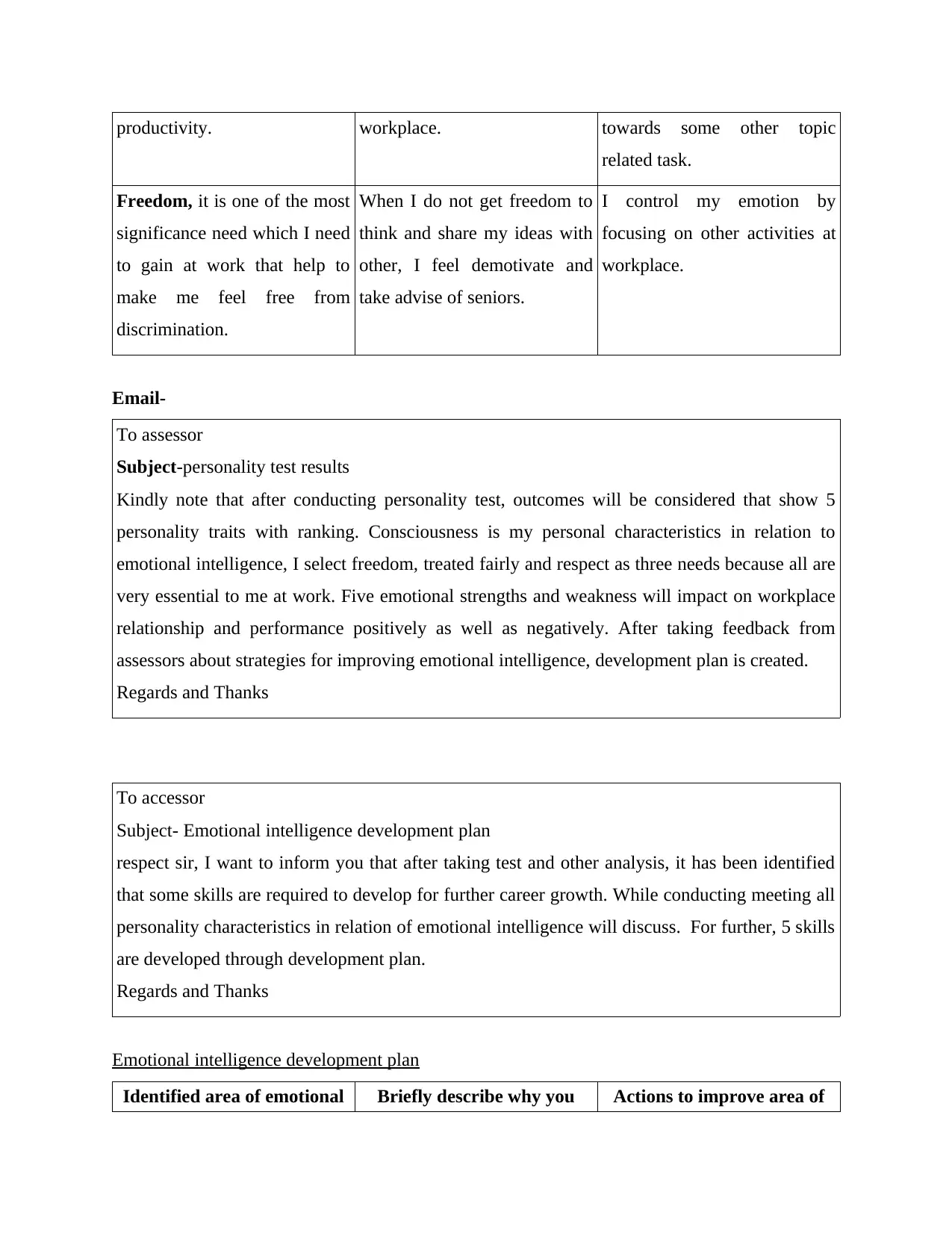
productivity. workplace. towards some other topic
related task.
Freedom, it is one of the most
significance need which I need
to gain at work that help to
make me feel free from
discrimination.
When I do not get freedom to
think and share my ideas with
other, I feel demotivate and
take advise of seniors.
I control my emotion by
focusing on other activities at
workplace.
Email-
To assessor
Subject-personality test results
Kindly note that after conducting personality test, outcomes will be considered that show 5
personality traits with ranking. Consciousness is my personal characteristics in relation to
emotional intelligence, I select freedom, treated fairly and respect as three needs because all are
very essential to me at work. Five emotional strengths and weakness will impact on workplace
relationship and performance positively as well as negatively. After taking feedback from
assessors about strategies for improving emotional intelligence, development plan is created.
Regards and Thanks
To accessor
Subject- Emotional intelligence development plan
respect sir, I want to inform you that after taking test and other analysis, it has been identified
that some skills are required to develop for further career growth. While conducting meeting all
personality characteristics in relation of emotional intelligence will discuss. For further, 5 skills
are developed through development plan.
Regards and Thanks
Emotional intelligence development plan
Identified area of emotional Briefly describe why you Actions to improve area of
related task.
Freedom, it is one of the most
significance need which I need
to gain at work that help to
make me feel free from
discrimination.
When I do not get freedom to
think and share my ideas with
other, I feel demotivate and
take advise of seniors.
I control my emotion by
focusing on other activities at
workplace.
Email-
To assessor
Subject-personality test results
Kindly note that after conducting personality test, outcomes will be considered that show 5
personality traits with ranking. Consciousness is my personal characteristics in relation to
emotional intelligence, I select freedom, treated fairly and respect as three needs because all are
very essential to me at work. Five emotional strengths and weakness will impact on workplace
relationship and performance positively as well as negatively. After taking feedback from
assessors about strategies for improving emotional intelligence, development plan is created.
Regards and Thanks
To accessor
Subject- Emotional intelligence development plan
respect sir, I want to inform you that after taking test and other analysis, it has been identified
that some skills are required to develop for further career growth. While conducting meeting all
personality characteristics in relation of emotional intelligence will discuss. For further, 5 skills
are developed through development plan.
Regards and Thanks
Emotional intelligence development plan
Identified area of emotional Briefly describe why you Actions to improve area of
Paraphrase This Document
Need a fresh take? Get an instant paraphrase of this document with our AI Paraphraser
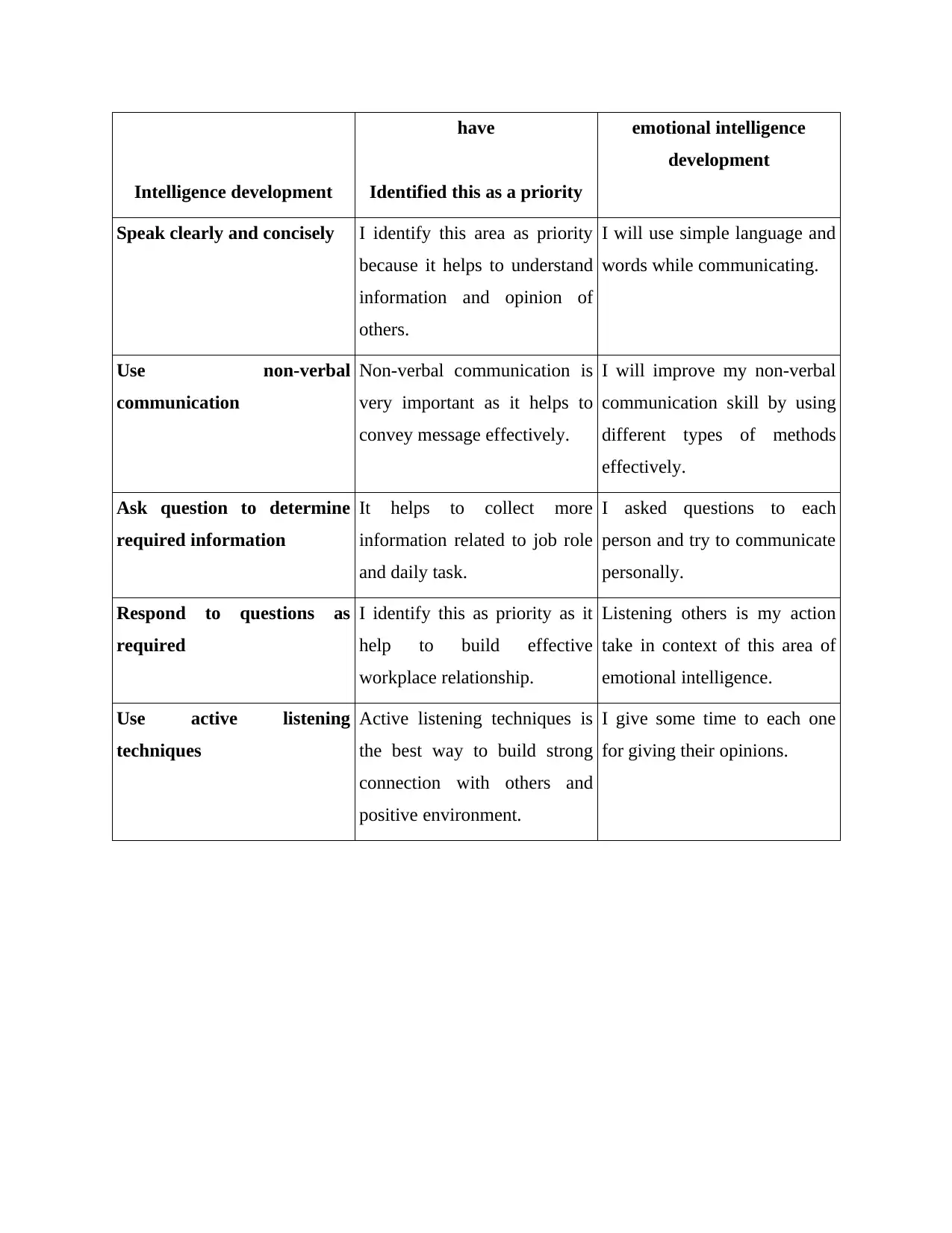
Intelligence development
have
Identified this as a priority
emotional intelligence
development
Speak clearly and concisely I identify this area as priority
because it helps to understand
information and opinion of
others.
I will use simple language and
words while communicating.
Use non-verbal
communication
Non-verbal communication is
very important as it helps to
convey message effectively.
I will improve my non-verbal
communication skill by using
different types of methods
effectively.
Ask question to determine
required information
It helps to collect more
information related to job role
and daily task.
I asked questions to each
person and try to communicate
personally.
Respond to questions as
required
I identify this as priority as it
help to build effective
workplace relationship.
Listening others is my action
take in context of this area of
emotional intelligence.
Use active listening
techniques
Active listening techniques is
the best way to build strong
connection with others and
positive environment.
I give some time to each one
for giving their opinions.
have
Identified this as a priority
emotional intelligence
development
Speak clearly and concisely I identify this area as priority
because it helps to understand
information and opinion of
others.
I will use simple language and
words while communicating.
Use non-verbal
communication
Non-verbal communication is
very important as it helps to
convey message effectively.
I will improve my non-verbal
communication skill by using
different types of methods
effectively.
Ask question to determine
required information
It helps to collect more
information related to job role
and daily task.
I asked questions to each
person and try to communicate
personally.
Respond to questions as
required
I identify this as priority as it
help to build effective
workplace relationship.
Listening others is my action
take in context of this area of
emotional intelligence.
Use active listening
techniques
Active listening techniques is
the best way to build strong
connection with others and
positive environment.
I give some time to each one
for giving their opinions.
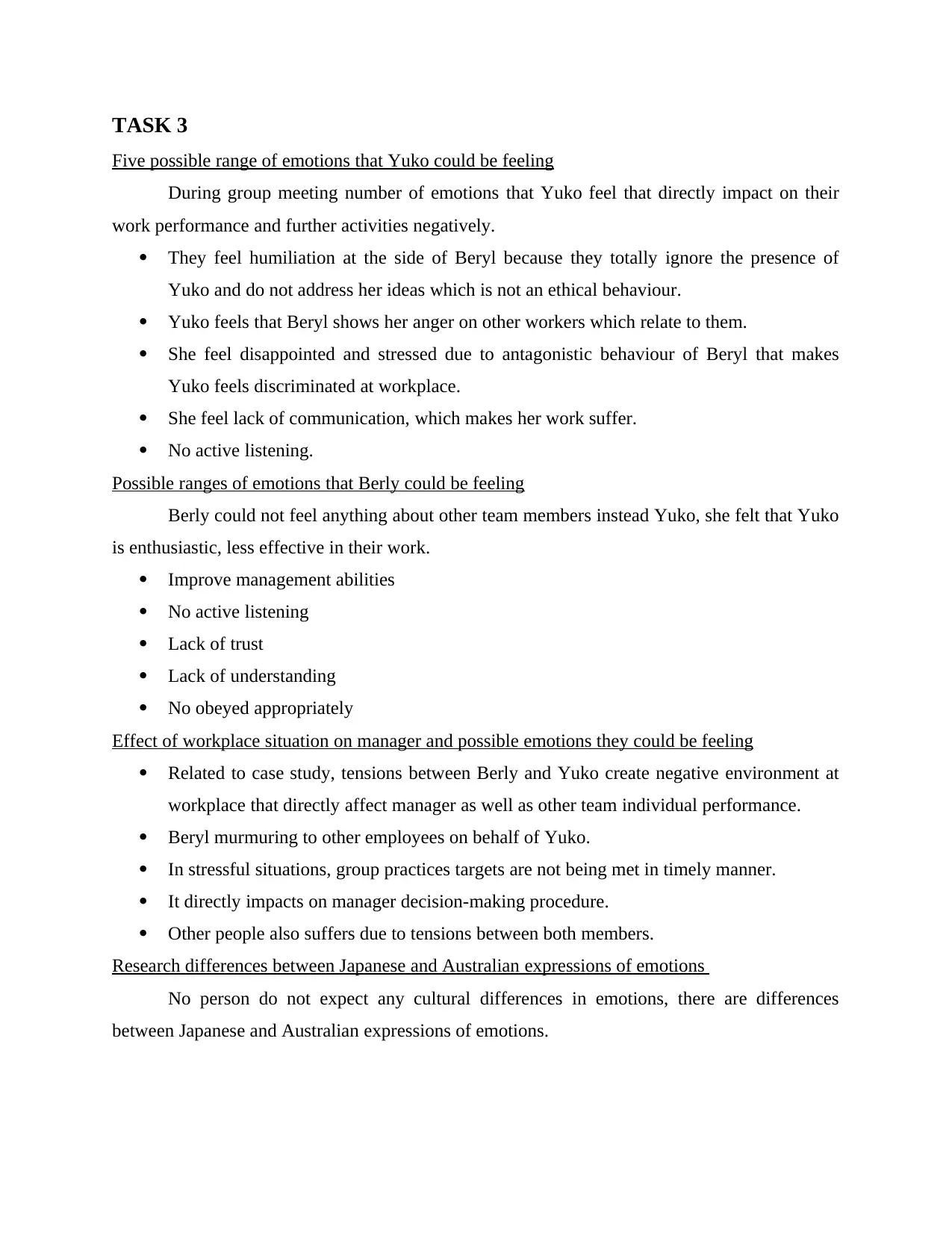
TASK 3
Five possible range of emotions that Yuko could be feeling
During group meeting number of emotions that Yuko feel that directly impact on their
work performance and further activities negatively.
They feel humiliation at the side of Beryl because they totally ignore the presence of
Yuko and do not address her ideas which is not an ethical behaviour.
Yuko feels that Beryl shows her anger on other workers which relate to them.
She feel disappointed and stressed due to antagonistic behaviour of Beryl that makes
Yuko feels discriminated at workplace.
She feel lack of communication, which makes her work suffer.
No active listening.
Possible ranges of emotions that Berly could be feeling
Berly could not feel anything about other team members instead Yuko, she felt that Yuko
is enthusiastic, less effective in their work.
Improve management abilities
No active listening
Lack of trust
Lack of understanding
No obeyed appropriately
Effect of workplace situation on manager and possible emotions they could be feeling
Related to case study, tensions between Berly and Yuko create negative environment at
workplace that directly affect manager as well as other team individual performance.
Beryl murmuring to other employees on behalf of Yuko.
In stressful situations, group practices targets are not being met in timely manner.
It directly impacts on manager decision-making procedure.
Other people also suffers due to tensions between both members.
Research differences between Japanese and Australian expressions of emotions
No person do not expect any cultural differences in emotions, there are differences
between Japanese and Australian expressions of emotions.
Five possible range of emotions that Yuko could be feeling
During group meeting number of emotions that Yuko feel that directly impact on their
work performance and further activities negatively.
They feel humiliation at the side of Beryl because they totally ignore the presence of
Yuko and do not address her ideas which is not an ethical behaviour.
Yuko feels that Beryl shows her anger on other workers which relate to them.
She feel disappointed and stressed due to antagonistic behaviour of Beryl that makes
Yuko feels discriminated at workplace.
She feel lack of communication, which makes her work suffer.
No active listening.
Possible ranges of emotions that Berly could be feeling
Berly could not feel anything about other team members instead Yuko, she felt that Yuko
is enthusiastic, less effective in their work.
Improve management abilities
No active listening
Lack of trust
Lack of understanding
No obeyed appropriately
Effect of workplace situation on manager and possible emotions they could be feeling
Related to case study, tensions between Berly and Yuko create negative environment at
workplace that directly affect manager as well as other team individual performance.
Beryl murmuring to other employees on behalf of Yuko.
In stressful situations, group practices targets are not being met in timely manner.
It directly impacts on manager decision-making procedure.
Other people also suffers due to tensions between both members.
Research differences between Japanese and Australian expressions of emotions
No person do not expect any cultural differences in emotions, there are differences
between Japanese and Australian expressions of emotions.
⊘ This is a preview!⊘
Do you want full access?
Subscribe today to unlock all pages.

Trusted by 1+ million students worldwide
1 out of 16
Related Documents
Your All-in-One AI-Powered Toolkit for Academic Success.
+13062052269
info@desklib.com
Available 24*7 on WhatsApp / Email
![[object Object]](/_next/static/media/star-bottom.7253800d.svg)
Unlock your academic potential
Copyright © 2020–2026 A2Z Services. All Rights Reserved. Developed and managed by ZUCOL.



